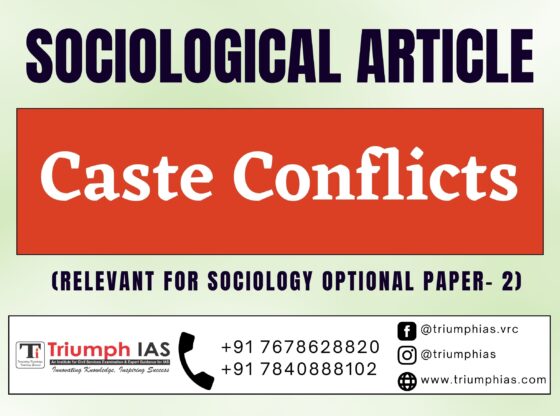Caste Conflicts
Relevant for sociology optional Paper- 2 (Unit- 13 : Social Changes in India)

Caste has been a defining feature of Indian society for centuries, with the system dividing people into rigid social hierarchies based on birth. Despite efforts to eradicate it, caste discrimination continues to be prevalent in India, leading to conflicts and tensions within the society.
The caste system in India is based on the Hindu concept of Varna, which categorizes people into four social groups: Brahmins (priests and intellectuals), Kshatriyas (warriors and rulers), Vaishyas (traders and businessmen), and Shudras (laborers and servants). The Dalits, or the “untouchables,” are considered outside of this system and historically faced severe discrimination and segregation.
Caste-based discrimination manifests in various forms, such as social exclusion, denial of access to resources and opportunities, and violence. Dalits and other lower-caste individuals are often subjected to physical and emotional abuse, forced labor, and sexual exploitation. They are also denied access to education, healthcare, and basic human rights, leading to a cycle of poverty and marginalization.
Caste conflicts in India have deep historical roots, with caste-based discrimination and violence dating back centuries. However, in recent years, there have been several high-profile cases of caste-related violence that have brought the issue to the forefront of national attention. For example, in 2018, a young Dalit man was beaten to death by a group of upper-caste men in Gujarat for attending a Garba dance event. The incident sparked widespread protests and outrage, highlighting the prevalence of caste discrimination in modern-day India.
One of the main factors contributing to caste conflicts in India is the unequal distribution of power and resources. Upper-caste individuals and communities hold a disproportionate share of wealth, education, and political power, while lower-caste individuals struggle to access even basic resources. This power imbalance creates a fertile ground for conflicts and tensions, as marginalized communities seek to assert their rights and demand justice.
Another factor that fuels caste conflicts in India is the politicization of caste identities. Political parties in India often use caste as a tool to mobilize voters and secure electoral victories, leading to the creation of caste-based vote banks. This practice reinforces caste-based divisions and perpetuates discrimination and conflict.
Efforts to eradicate caste discrimination in India have been ongoing for decades, with various legal and policy measures introduced to address the issue. For example, the Indian Constitution prohibits discrimination on the basis of caste and provides affirmative action policies, such as reservations in education and employment, for disadvantaged communities. However, these measures have had limited success in eradicating caste-based discrimination, with many individuals and communities still facing systemic oppression and marginalization.
To effectively address caste conflicts in India, there needs to be a comprehensive approach that addresses the root causes of discrimination and inequality. This includes addressing the unequal distribution of power and resources, promoting inter-caste dialogue and understanding, and challenging the politicization of caste identities.
Education is also a critical tool in addressing caste conflicts in India. By promoting education and awareness about caste discrimination and its negative impacts, individuals and communities can become better equipped to challenge discriminatory practices and advocate for their rights.
In conclusion, caste conflicts in India continue to be a significant challenge, with deep-rooted social and economic inequalities fueling discrimination and tension. Addressing the issue requires a comprehensive approach that challenges power imbalances, promotes inter-caste dialogue and understanding, and prioritizes education and awareness. Only through sustained efforts can India hope to eradicate caste-based discrimination and create a truly inclusive and just society.
For more such free UPSC notes, Articles, News & Views Join our Telegram Channel. https://t.me/triumphias
Click the link below to see the details about the UPSC – Civils courses offered by Triumph IAS. https://triumphias.com/pages-all-courses.php


